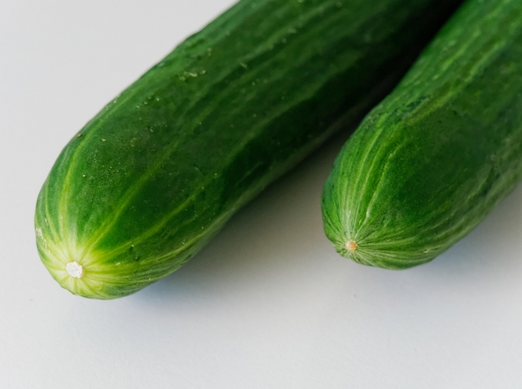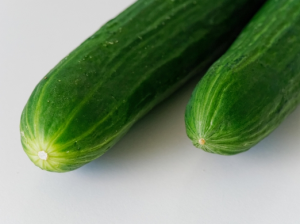Today’s question: can dogs eat cucumbers? Are cucumbers good or bad for dogs? Scroll down for detailed answers.
Being a dog owner comes with its set of responsibilities. In order to have a healthy pet, proper attention must be paid with regard to providing him with a beneficial and well-balanced diet. This is the key to your pet living a healthy, long life, isn’t it? Your pet relies on you entirely. Besides the protein intake dogs’ utterly require, vegetable and fruit treats are also advisable for your dog to enjoy from time to time.
Adding veggies to the diet of your dog can help add nutrients and hydration to the diet of your dog, as well as a bit of variety in their dog food menu. Dogs do not technically need veggies, as the appropriate amount of vitamins should be in their dog food. However, many dog foods used veggies simply as fillers, and not as whole foods designed to offer the added nutrients to the diet of your dog. Dogs that eat veggies seem to have better hydration, better blood work, and more energy. Dogs that eat veggies as treats, rather than milk bones and cookies, also have a lower weight and may be without weight induced health problems such as diabetes and high blood pressure.
With the large variety of veggies able to be enjoyed by dogs, you as a dog owner may wonder which your dog would benefit the most from. Are dog’s finicky eaters in regards to veggies? Should dogs eat veggies with high water content? Thus, you may wonder – can dogs eat cucumbers? Cucumbers are relatively soft, made up of water, low in calories, low in sodium, and are not greasy foods that will damage a heart! Your dog most certainly can enjoy cucumbers! Let’s find out more about the matter.
Can Dogs Eat Cucumbers?
Yes, dogs can eat cucumbers.
According to ASCPA, cucumbers are non-toxic to cats, dogs, and horses. Cucumbers are great snacks for your pet to enjoy – they are healthy vegetables filled with both nutrients and vitamins, which are beneficial for your dog’s health. The added hydration offered to your dog via cucumber will help on a hot day or in the event your dog has trouble drinking water. You can never go wrong with an occasional cucumber treat. This is why they are such a great alternative when it comes to snacks to spoil your dog with.
Cucumbers are great for their portability, and their long lasting freshness. Since cucumbers have an outer skin, the inside is protected from any potential chemicals and toxins that may land on the veggie in the natural world. You can wash the outside of the cucumber well to remove any toxins, but you can also skin the cucumber and feed to your dog in this way. Offering slices to your pup while on a walk can help your dog with energy to continue the route, and having slices on hand to be used as training rewards is also a good habit to keep.
Nonetheless, you should be aware of the fact that excessive vegetable treats, including cucumber snacks, are not advisable to be given on a regular basis. No matter how good a veggie is to consume, veggies should only be eaten in moderation. Dogs are not meant to eat human foods at all, therefore eating only small amounts at irregular intervals is enough to keep your dog, and his/her body, healthy. This rule applies to all snacks. Moderation is the decisive element when it comes to treats.
Health Benefits of Cucumbers
Cucumbers surely embody a wide range of health benefits which make them a healthy addition to our diet and our pet’s diet as well. Cucumbers are an excellent source of vitamin K, C and other essential minerals such as iron, manganese and copper. Additionally, cucumbers contain high levels of beneficial phytonutrients, presenting anti-inflammatory and antioxidant properties.
Dogs that have proper vitamins in their diet will benefit from anti-inflammatory and antioxidant properties. These properties keep your dog healthy and more apt to handle an influx of germs and potential sickness. Dogs need to have the ability to fight sickness from the inside out, just as their owners. Providing these vitamin properties will allow your dog to do so.
Since the cucumber has high levels of water and beneficial fiber, cucumbers are a great treat for your dog as they significantly enhance the health of both his skin and coat. Apparently, a cucumber doesn’t exercise marvels on our skin only but on dogs’ skin as well! Water and hydration are the key components to healthy skin and fur.
The more hydrated your pup, the less prone to dry and itchy skin s/he will be. The fur will also be smooth and shiny, and appeasing to the eye. When a human is dehydrated, the first signs are often visible in the skin and hair. As with humans, the hydration of a dog can be viewed through examining the skin and fur.
Added hydration and fiber also allow your dog to rid him/herself of waste and toxins within the body. Having a properly functioning digestive system will allow your pup a healthy immune system and prevent toxic build up that leads to potential diseases. Dogs need to have purified digestive systems just as humans, if not more so. Since dogs age faster than their owners, dogs need to be kept healthy at an increased rate to ensure their overall health. Most dogs are safe to eat only dog food, but adding in cucumbers to their diet will ensure their health needs are being met and lower the risk for potential dehydration.
If your pet is overweight, a couple of cucumber snacks every now and then are recommended. Cucumbers are low on calories, salt, and sugar. Thanks to the presence of alcohol acid, a cucumber prevents carbohydrates from turning into fat. If your canine friend is not picky about food and would eat anything you would feed him, rewarding the pet with cucumber treats for behavioral training is a positive idea. Cucumbers will make your pet feel fuller, longer, possibly preventing your dog from overeating.
The added water content and fiber will also help purify your dog’s stomach and digestion, working towards eliminating excess waste and improving the metabolism. Offering cucumbers is also good for weight loss int hat the cucumber substitutes for food that may add weight and harmful ingredients rather than remove them.
Reducing Inflammation
Cucumbers incorporate a significant source of effective antioxidant nutrients such as vitamin C, manganese and beta-carotene. According to animal studies developed in this area, cucumbers’ anti-inflammatory and antioxidant properties aim at reducing inflammation and possible infections. This added bonus of the cucumber will be useful to most any dog despite the size or breed. The cucumber is easily digested and should not cause complications.
The fact that the cucumber is so easy for a dog to enjoy, means the more benefits your dog can receive from this veggie! A veggie with anti-oxidant properties is sure to fight infection and speed a recovery of sickness than any other type of food offered. Thus, the consumption of a cucumber may improve your dog’s immune system, as well as help it fight various inflammations.
Moreover, cucumbers encompass flavonoids with antioxidant functions as well. Flavonoids in cucumbers present free-radical scavenging and pain-relieving effects. Fighting pain in a natural way is important for any species. Dogs are unable to speak to us and tell owners when they in pain using words.
Dogs must rely on their bodies and their eyes to communicate with their owners when in pain. Offering cucumbers that have potential pain lessening ingredients will help you to treat any aches and pains your dog may experience without using harmful chemicals and medications.
Prevention of Cancer
Cucumber’s effectiveness for fighting cancer is still to be officially acknowledged, but there are scientific research still being developed on this matter. Some do not require scientific reasoning and studies to confirm the power of a particular entity of a vegetable, therefore cucumbers are often thought of as potential cancer cures.
Nonetheless, cucumbers contain a certain compound called cucurbitacins, which is a powerful phytonutrient. In this view, scientists indicated that curcurbitacins aim at tracking down cancerous cells and preventing them from further developing and attacking healthy cells.
While cucumbers may not prevent cancer in an entirety, a component of the cucumber may work to halt cancer from spreading or further developing. In regards to cancer, in both humans and dogs, any type of natural food help to slow the disease should be considered and looked into. In any case, eating cucumbers will not hurt you, taste great, and do wonders for your overall health. The same is true for the dog.
Improves Brain Health
Thanks to the presence of a certain anti-inflammatory flavonol – fisetin, cucumber’s consumption aims at improving brain health. It enhances the pet’s memory, whilst at the same time effectively shelters the brain nerve cells from age-related problems.
Disadvantages of Cucumbers
As healthy as cucumbers may be, they may exercise detrimental effects on your pet’s health. Even if cucumbers are only fed to your pup occasionally, vegetable treats may eventually lead to upset stomach or diarrhea. Too much water (from a water dish and a water based food) can cause stomach upset and bloating.
Dogs react differently to distinct foods, thus there is not a general rule which applies to all dogs. Therefore, it is advisable to pay special attention to any possible negative reaction your dog might experience after having eaten fresh cucumbers. If you notice any side effects, it’s better not to feed it to your pet in the future.
Furthermore, if you remark your dog is suffering from severe stomach ache, it is best to take him to the vet in order to settle the cause of the distress. Your pet might present excessive sensitivity to a range of human foods, maybe even to cucumbers. Assumptions are never right when it comes to your pet’s health. In this view, a visit to the vet is in order if such an unfortunate ailment occurs.
Preparing Cucumber Treats for Your Pup
If you’re feeding cucumber treats to the dog for the very first time, it’s recommended to feed tiny amounts at first in order to observe his reaction to the new ingredient. Firstly, you should thoroughly wash the vegetable in order to remove residues of pesticides which are harmful. Consider slicing the cucumber before feeding it to your dog, so that your pet will digest it easily.
Related articles:
References:
http://canigivemydog.com/cucumbers
http://dogcare.dailypuppy.com/dogs-cucumbers-2154.html
http://whfoods.com/genpage.php?tname=foodspice&dbid=42
http://pets.webmd.com/ss/slideshow-people-foods-your-dog-can-eat
https://www.aspca.org/pet-care/animal-poison-control/toxic-and-non-toxic-plants/cucumber









Leave a Comment